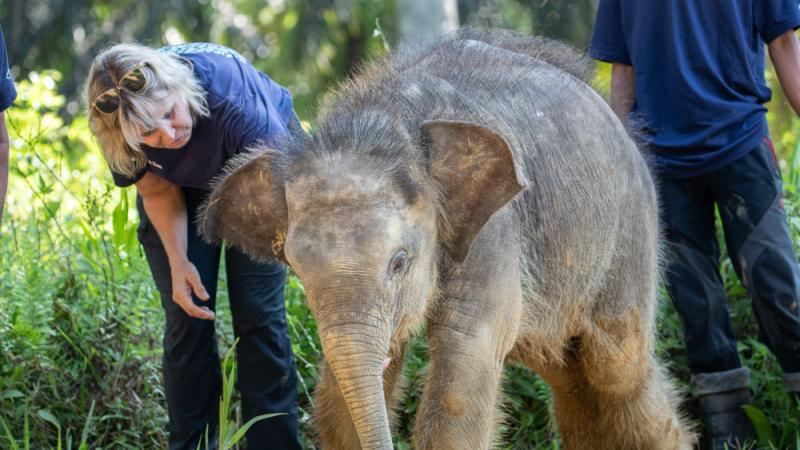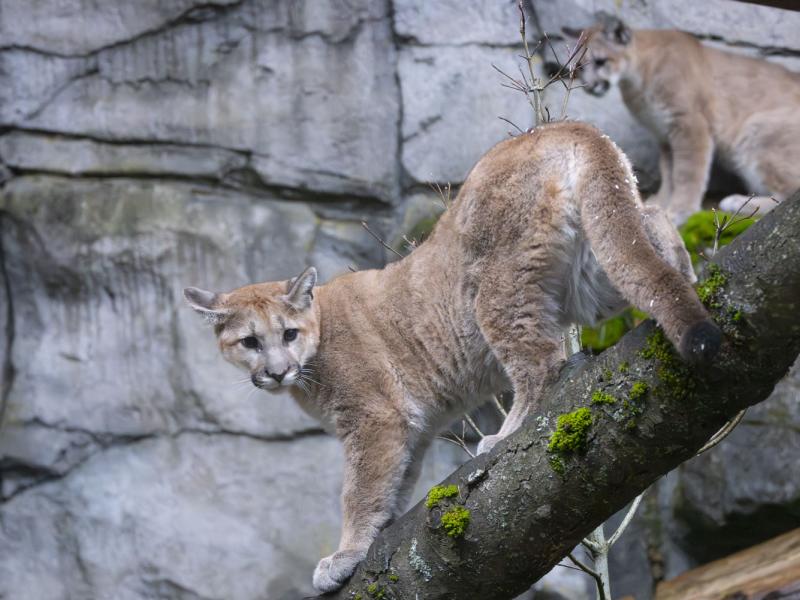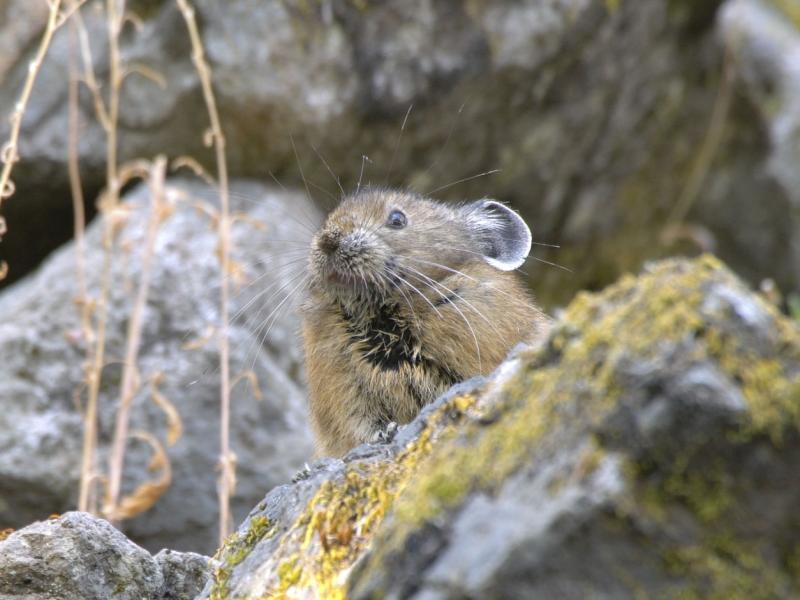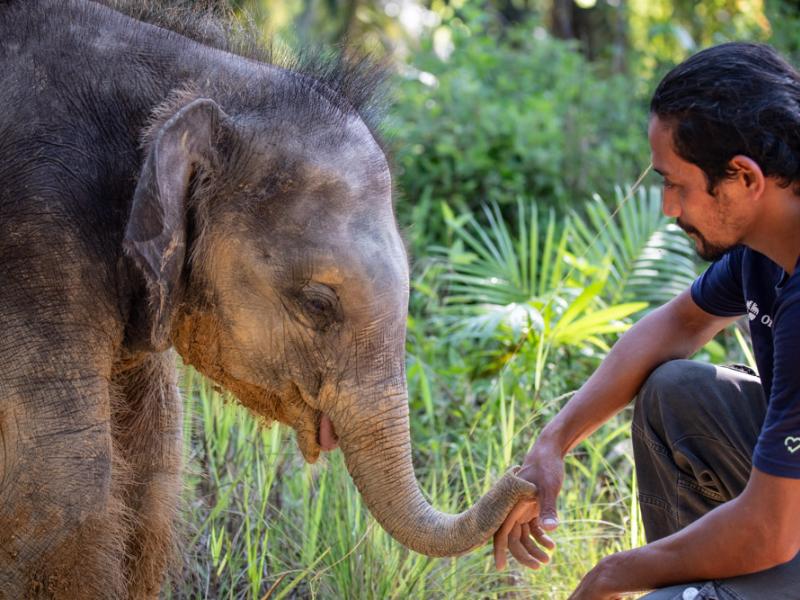Giving an orphaned elephant calf a second chance: A Q&A with Dr. Sharon Glaeser

As a very young calf, Agathis was found wandering on her own in a plantation area on the east coast of Borneo, in need of urgent medical care. She had a serious infection; she was dehydrated and weak and had not nursed in at least two weeks.
Rangers from the Sabah Wildlife Department Wildlife Rescue Unit rescued her and brought her to the Borneo Elephant Sanctuary. Now, two rangers sponsored by the Oregon Zoo care for her around the clock — an elephant calf cannot survive on their own.
We spoke with Dr. Sharon Glaeser, the zoo’s elephant conservation lead, about Agathis’s story, and what the Oregon Zoo and our partners are doing to help imperiled elephants in Borneo and around the world.
Oregon Zoo: Who is Agathis?
Dr. Sharon Glaeser: Agathis is a little orphaned elephant calf in Sabah, Malaysia Borneo. She was found wandering on her own in a plantation area on the east coast of Borneo. She was not found anywhere near her herd, and she had been on her own for about two weeks.
When she was found, she needed urgent medical care. She had a serious infection, and she was dehydrated and weak.
OZ: Who found her? What happened next?
SG: She was found by a plantation worker who notified the Sabah Wildlife Department. The Sabah Wildlife Department Wildlife Rescue Unit, along with other staff, came to the site and assessed her condition and made a decision to bring her into human care in order to treat her medical needs.
OZ: Where is Agathis now?
SG: Agathis is cared for by staff at the Sabah Wildlife Department. There are two rangers there sponsored by the Oregon Zoo, Mr. Raziman and Mr. Rosa, and they’re with Agathis all day, every day.
Baby elephants need full-time care. Agathis couldn’t eat on her own — she needed to be bottle-fed every two hours, day and night. The rangers became her surrogate moms, doing everything a mother would to care for her calf. The trust she places in them is so beautiful to see. She goes outside to play with them every day.
OZ: What will happen as she gets older?
SG: Eventually Agathis will be able to join the other elephants and she'll have access to the forest nearby and water to swim in and socialization that is so important for an elephant. This is the best that we can do with her right now, but conditions are getting better as we have more resources to share.
OZ: How else is the Oregon Zoo involved?
SG: Every year, the Oregon Zoo elephant care team travels to Sabah to work with the team there, helping them make the most of what they have, to give the elephants the best life possible. It’s important work, and we’ve seen a lot of positive changes over the five years we’ve been supporting the rescue unit.
But elephants in Borneo are facing really big challenges. They’re some of the most endangered elephants in the world. People and elephants in Borneo are competing for land and food. The forests are no longer intact, and these elephants don’t have safe ways to travel.
OZ: What are people doing in Borneo to help?
SG: Our partners live and work in these communities. They’re leading this effort.
Seratu Aatai works directly with villages to train them in elephant safety and strategies for coexisting.
Another partner, HUTAN, is creating forest corridors that let elephants and other wildlife like orangutans move from place to place without going through villages and encountering people.
We’re seeing slow but steady progress — the forests are growing, they’re healthier, and the wildlife can survive in this environment as long as people give them a chance.
OZ: What about Agathis? Can she ever return to the wild?
SG: Most elephant calves who come into human care in Borneo, like Agathis, can’t be released back to the wild. She’ll always live with her adopted family at the care center.
OZ: Most people will never get to interact with an elephant that young. What would you want people to know about Agathis or other elephants like her?
I think it's important to keep in mind that although it's really, really special to have the opportunity to interact with this tiny little baby, that she is in human care for serious reasons. And what I would love most for her was if she could have stayed with her mom and lived safely for the rest of her life and had her own babies and her own herd. And so we really want to do whatever we can to keep little elephants like her in the wild with their mom living a typical elephant life.
OZ: Is there a reason to feel hopeful about elephants in Borneo?
SG: I think there is reason to feel hopeful about elephants in Borneo. The challenges are immense, both in the wild and in human care, but there is reason for hope because there are people doing really, really good work and dedicating their lives to maintaining and even further growing suitable habitat for elephants. And then when they are in human care, the people caring for them are very dedicated and committed to those individuals and groups of animals. And they are also committed to doing what they can to teach people the importance of trying to coexist and keep them in the wild.
More News

Rescued cougar cubs are venturing out
A pair of orphaned cougar cubs, rescued and brought to the zoo by Washington Department of Fish and Wildlife staff in November, have begun exploring their outdoor habitat.April 17, 2025

Zoo seeks pika watchers for summer season
The Oregon Zoo is recruiting volunteers for Cascades Pika Watch.April 15, 2025

Zoo convenes action for imperiled elephants
Sabah government representatives joined conservation NGOs, local communities, palm oil producers, and tourism operators this week in the fight to save the world’s smallest elephants from extinction.April 11, 2025

